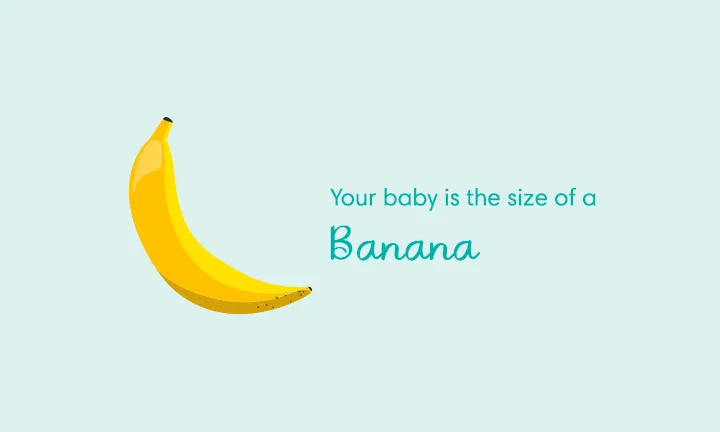21 Weeks Pregnant
21 Weeks Pregnant: Your Baby’s Development
Heart throb. Your baby's heartbeat is now loud enough to be heard through a simple stethoscope, but the beat can be difficult to distinguish from your own. Listen for the faster rhythm - a baby's heartbeat is 120 to 160 beats per minute, about twice as fast as yours. Many women think it sounds like galloping horses.
Baby sleep cycles. Your baby is already starting to sleep and wake in subtle cycles. Ultrasounds show that unborn babies may even settle into a favorite sleeping position.
Fingers and toes. Around 21 weeks, your little one’s fingers and toes are completely formed, complete with little fingerprints and toe prints. She may even start sucking on her thumb.
How Big Is Your Baby at 21 Weeks?
When you’re 21 weeks pregnant, your little one is roughly the size of a banana. She will be around 23 cm in length and weigh 283 to 370 grams.

Mom’s Body at 21 Weeks
So, when you get to 21 weeks pregnant, how many months along are you? At 21 weeks, you’re entering month six of pregnancy.
You may have had some heartburn and indigestion earlier in the first trimester, but as your uterus gets larger, it may start pushing up against your stomach. This can cause you to have heartburn more frequently.
Around this time, your pregnancy hormones may also cause hot flashes, and the extra weight can cause some aches and pains during the coming weeks.
21 Weeks Pregnant: Pregnancy Symptoms
Sore spots. Backaches , especially in the lower back, are quite common during pregnancy. When you are 21 weeks pregnant, your growing belly is shifting your center of gravity and pulling your lower back forward. Meanwhile, the hormone relaxin is loosening every joint and ligament in your body, which will allow your pelvis to expand when it's time for delivery.
Heartburn. Around this week, it’s normal to experience heartburn. In addition to the uterus pushing against your stomach, pregnancy hormones relax the valve between your esophagus and stomach, causing some stomach acid to leak into the esophagus.
Hot flashes. Your pregnancy hormones and your increased metabolism can leave you feeling hot and sweaty. Make sure you stay cool by wearing loose clothing and drinking plenty of water. Switch on a fan or crank up the air conditioning, and try to stay as comfortable as possible.
Stretch marks. As your belly grows during your pregnancy, you may notice some reddish-brown, pink, or purple lines on your skin. Stretch marksform when your skin stretches over a short period of time and can appear along your belly, hips, thighs, buttocks, and breasts. Your skin may start to feel itchy, too; applying moisturizer should help.
Leg cramps. If you feel any cramping in your legs, don’t worry; this a common complaint from moms in the second trimester. You may notice that cramps tend to strike more at night. Try to stretch your calf muscles before bed, drink plenty of water, or have a warm bath or shower to help ease the discomfort or prevent cramping altogether.
21 Weeks Pregnant: Things to Consider
Back savers. To help alleviate back pain, make these adjustments in your daily routine. Whenever you sit, use a footrest to elevate your feet slightly. If you need to stand for a long period of time, put one foot on a small stool to take some pressure off your lower back. Treat yourself to a warm bath for additional relief. If your backache won't go away, give your healthcare provider a call.
B vitamin boost. The B vitamins, including B1, B2, and B6, are key nutrients because they supply energy for your baby’s development. They also help promote good vision and help build the placenta, along with other body tissues. If you’re taking a prenatal supplement, you should be getting enough B vitamins already, but you can also get them from dietary sources like liver, pork, poultry, bananas, and beans.
The call for choline. Choline is another nutrient you may need more of when you’re pregnant. Even though your body can produce choline naturally, when you’re pregnant, you’re not making enough for the two of you. This is easy to top up with a balanced diet, so try to add more chicken, beef, eggs, milk, and peanuts, all of which will help supplement your choline levels.
The balancing act. As your uterus gets bigger, you may notice your center of gravity shifts, and you may feel a little off balance. Take care of yourself by wearing flat shoes, being careful on stairs, and avoiding slippery surfaces to reduce the risk of falling. If you do fall and you’re concerned, if you’re bleeding, or if you start experiencing contractions, contact your healthcare provider.
21 Weeks Pregnant: Ask Your Doctor
If you’re suffering from back pain, you may want to ask your doctor about whether a maternity belt can help.
Talk to your doctor about how to get nutrients like choline and B vitamins in your diet.
If you’re worried about any symptoms you have, including any cramping or discomfort, discuss them with your healthcare provider.
21 Weeks Pregnant: Your Checklist
Get a footrest to elevate your feet slightly whenever you sit.
Treat yourself to a warm bath to help relieve back pain
Make sure your baby registry is done, especially if your baby shower is happening soon.
Sign up for even more weekly pregnancy tips.
